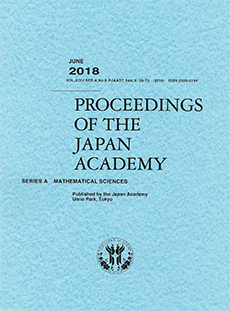Abstract
Let $L_{a}(x)$ be Lebesgue’s singular function with a real parameter $a$ ($0<a<1, a \neq 1/2$). As is well known, $L_{a}(x)$ is strictly increasing and has a derivative equal to zero almost everywhere. However, what sets of $x \in [0,1]$ actually have $L_{a}'(x)=0$ or $+\infty$? We give a partial characterization of these sets in terms of the binary expansion of $x$. As an application, we consider the differentiability of the composition of Takagi’s nowhere differentiable function and the inverse of Lebesgue’s singular function.
Citation
Kiko Kawamura. "On the set of points where Lebesgue’s singular function has the derivative zero." Proc. Japan Acad. Ser. A Math. Sci. 87 (9) 162 - 166, November 2011. https://doi.org/10.3792/pjaa.87.162
Information





